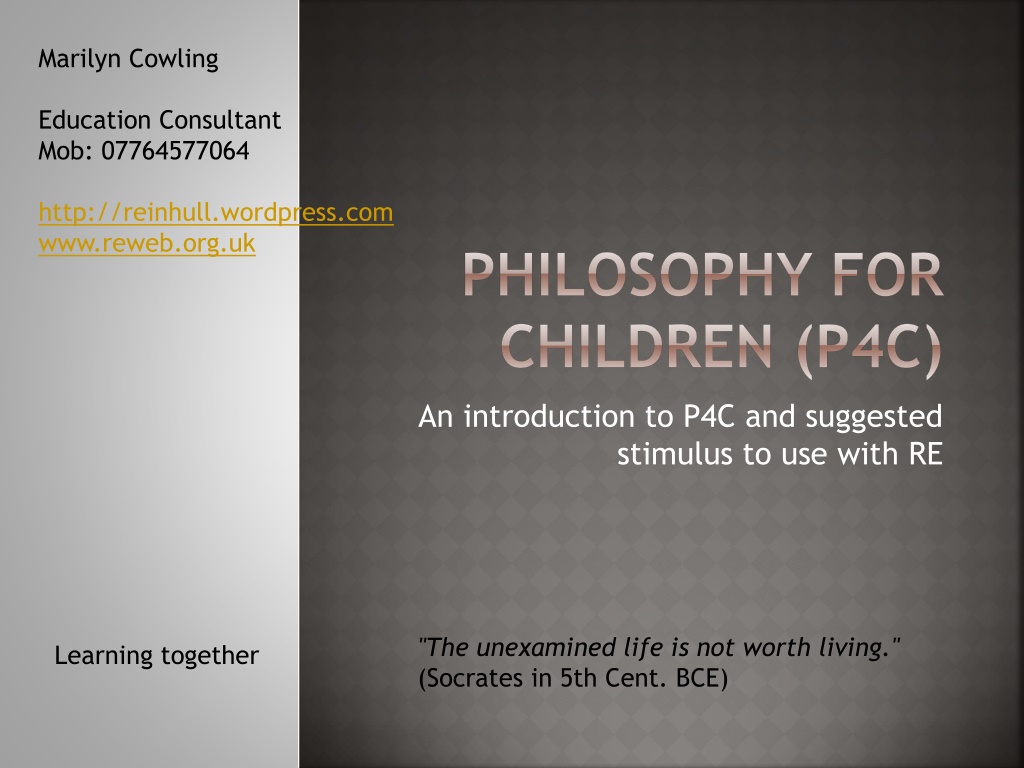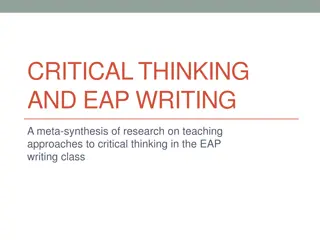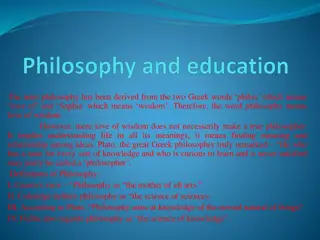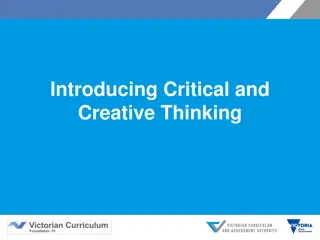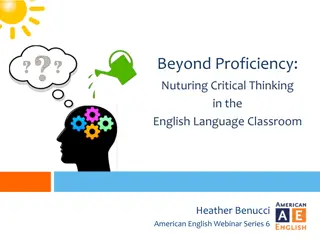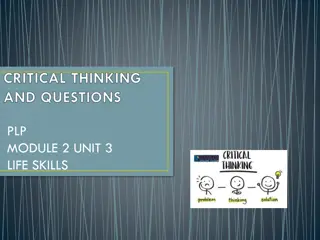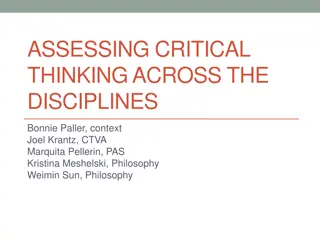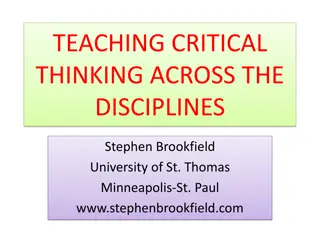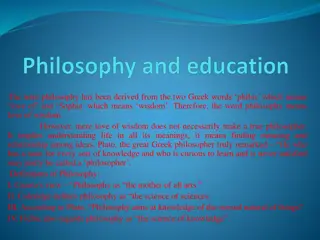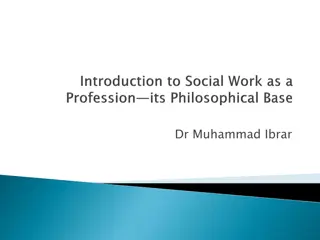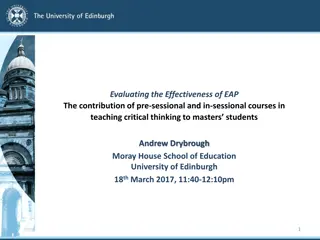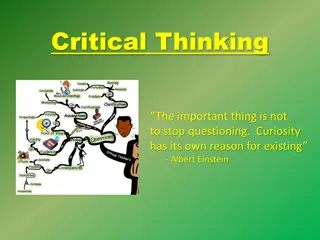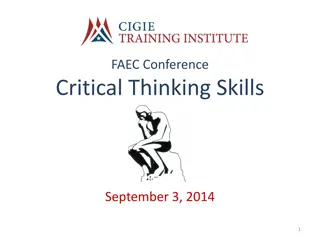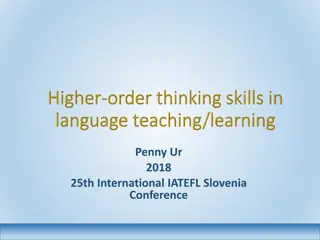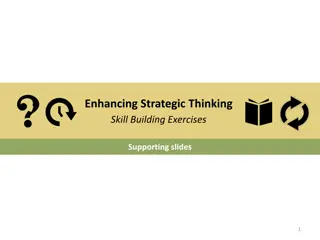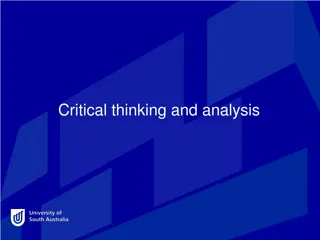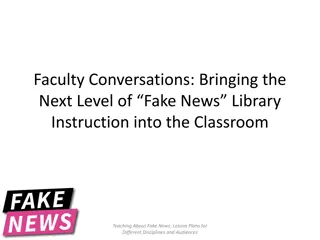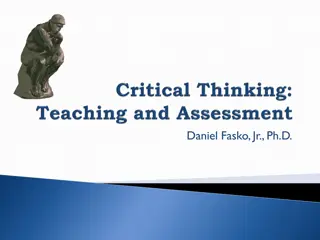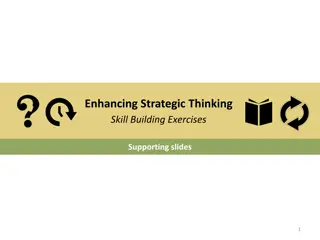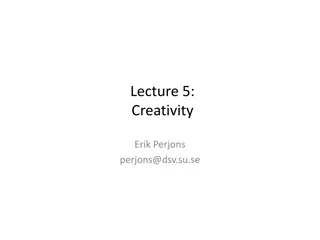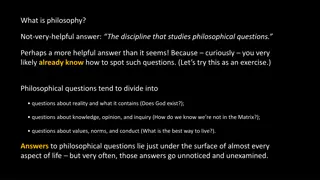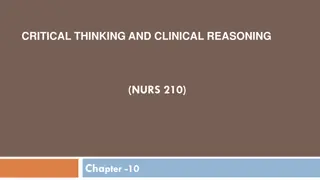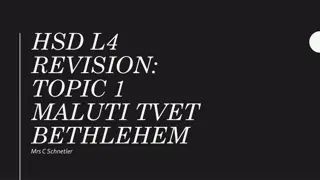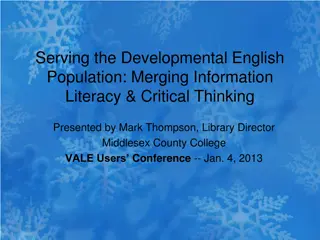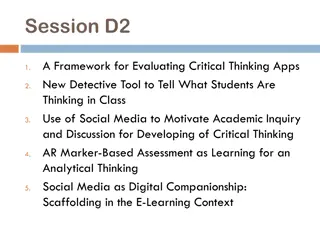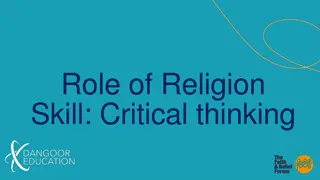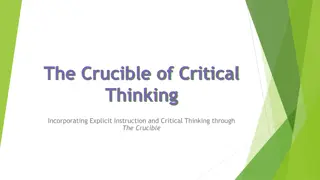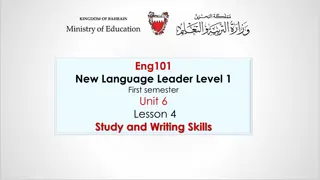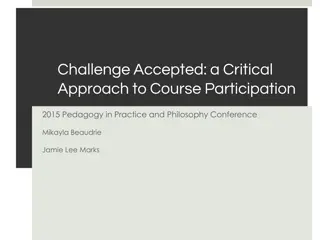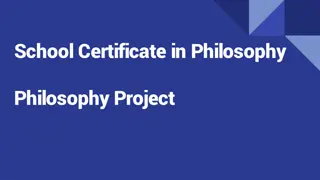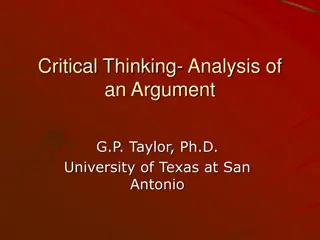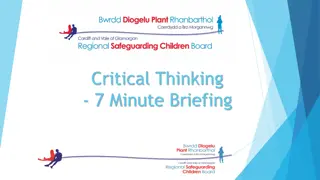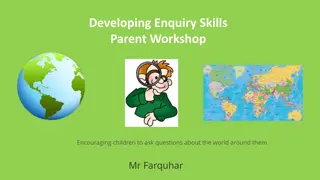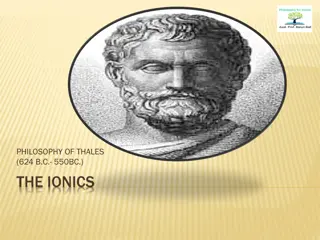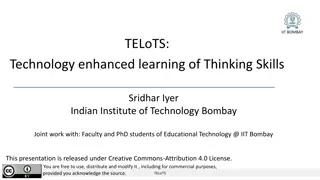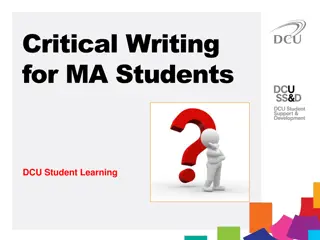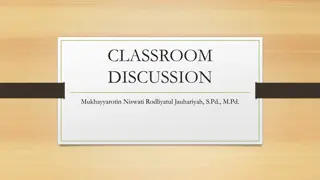Exploring Philosophy for Children: Enhancing Critical Thinking Skills
Delve into the world of Philosophy for Children (P4C) with Marilyn Cowling, an Education Consultant. Learn about the importance of asking philosophical questions, engaging in activities like diamond ranking, and fostering a love for wisdom among young minds. Discover how P4C encourages deep thinking, questioning, and the exploration of fundamental human concepts. UNESCO's commitment to promoting philosophical learning in schools underscores the significance of nurturing critical thinking skills for a brighter future.
Download Presentation

Please find below an Image/Link to download the presentation.
The content on the website is provided AS IS for your information and personal use only. It may not be sold, licensed, or shared on other websites without obtaining consent from the author. Download presentation by click this link. If you encounter any issues during the download, it is possible that the publisher has removed the file from their server.
E N D
Presentation Transcript
Marilyn Cowling Education Consultant Mob: 07764577064 http://reinhull.wordpress.com www.reweb.org.uk PHILOSOPHY FOR CHILDREN (P4C) An introduction to P4C and suggested stimulus to use with RE "The unexamined life is not worth living." (Socrates in 5th Cent. BCE) Learning together
Live as if you were to die tomorrow. World Learn as if you were to live forever. Philosophy Day 17 November 2016 Mahatma Gandhi Education is not the learning of facts but the training of the mind to think. Albert Einstein
PHILOSOPHY Philosophy asks the question, what is it to be human? There are many other questions that follow from this such as, 'Who am I?', ''What am I?', 'Is there life after death?', 'How should we live?', 'What kind of world do we live in?', 'How is language possible?'. The Greek root of Philosophy is 'love of wisdom' and philosophy tries to provide a thorough, theoretical backing for the claims of wisdom, based on reasons. (philo love, sophie wisdom)
Activity: Diamond ranking It s one thing for a person to offer an opinion, another to offer a reason for that opinion, and yet another to offer a good reason. Help pupils to: recognise different strengths or qualities of reasons practice evaluating and ranking reasons explore why reasons might be strong or weak consider categories for reasons (inaccurate, insufficient, unrelated, morally questionable, appeal to popularity)
PHILOSOPHICAL QUESTIONS: are open to examination, further questioning and enquiry can't be answered by appealing only to scientific investigation or sense experience are questions about meaning, truth, value, knowledge and reality In Philosophy for Children (P4C) children are encouraged to create their own philosophical questions Teachers say that after just a few weeks of regular P4C they notice a change in the quality and depth of children's questioning. This has a powerful effect on children's thinking and learning across the curriculum
UNESCO MAKES A RESOLUTE COMMITMENT TO ENCOURAGE LEARNING TO PHILOSOPHIZE IN SCHOOLS The basic issue raised by P4C concerns the very meaning we wish to give to tomorrow s schools: they will need to be places that foster independent thought, thoughtful citizenship and the full development of each child. If it is the task of education in general to provide children with the maps of a complex world in a perpetual state of agitation , philosophy can probably be the compass enabling one to navigate * in that world. *Learning: The Treasure Within, op. cit., p. 91.
P4C P4C puts enquiry at the heart of the learning process requires the exploration of open and genuine questions involves the development of reasoning and reflection, both public and private; engages emotions and thoughtful expression presents intellectual, social and emotional challenges encourages open-mindedness and creates conditions for change
P4C AND OFSTED The Office for Standards in Education, Children s Services and Skills (OFSTED) the national schools inspectorate has unfailingly commended teachers and schools for incorporating P4C into their curricula, although it is still not officially required. It is estimated that 2,000 to 3,000 schools in England, Scotland and Wales have P4C in their curriculum, and there is every reason to suppose that this number will continue to grow significantly as the various national curricula move further in the direction of competence-based learning and teaching. In other countries, P4C is gaining some recognition from education ministries, which is allowing it to become more institutionalized.** **Teaching Philosophy in Europe and North America
P4C IN THE UK No primary school in the United Kingdom had offered philosophy as part of their curriculum prior to 1990. There was, however, a small group of educators, which included Robert Fisher, then director of the Thinking Skills Centre at Brunel University, who were experimenting with P4C. The group received a considerable boost in 1990, when the BBC produced an hour-long documentary about P4C, called Socrates for Six Year Olds, which attracted a wide audience. The documentary aroused a great deal of public interest, which led to the foundation of the Society for Advancing Philosophical Enquiry and Reflection in Education (SAPERE), based at Oxford Brookes University, with the aim of promoting the practice. At about the same time, a Centre for Philosophical Enquiry was established in Glasgow, where Dr Catherine McCall had begun working with Scottish children and parents, a project that was bearing fruit.
WHERE P4C IS EMPLOYED... Research in Scotland showed: significant gains in verbal and non-verbal reasoning improvements in listening, communication, behaviour, questioning, reasoning, reading and understanding
PHILOSOPHY FOR CHILDREN (P4C) Improves teaching and learning for the lasting benefit of individuals, schools, colleges and communities. In P4C the teacher facilitates a student-led discussion on a philosophical question. P4C builds higher order thinking, questioning, speaking and listening skills. It creates respect for others, promotes engagement with learning and enhances educational development. Over 25 years, SAPERE has trained 27,000 teachers in the practice of P4C. The EEF has validated P4C in its pupil premium toolkit.
WHAT IS A PHILOSOPHICAL QUESTION? Try this quiz! 1) Which major river flows through Paris? 2) When was the Battle of Hastings? 3) Which type of Christianity is led by the Pope? 4) Are words 'real'? 5) What makes something 'wet'? 6) What makes something 'beautiful'? 7) A 10,000 car is discounted by 25%. What does it cost? 8) When should people get married? 9) What is the fruit of the third behind? 10) Why does water 'bubble' when it is boiling? 11) Who are known as the 'Gunners'? 12) Is it ever good to lie?
NOW ANSWER THESE QUESTIONS: a) Are all of these questions good 'quiz questions'? b) Which ones can be answered with a single, correct answer? c) Which ones might be a matter of opinion? d) Were there any that were not really questions at all? e) Which ones, do you think, were philosophical questions? f) Now, can you try and say what philosophical questions have in common in your own words? g) Think up two philosophical questions of your own. Do others agree that they are philosophical? (Perhaps you need to philosophise about them?!)
ABOUT PHILOSOPHY 'Philosophy' means 'love of wisdom' in Greek. If you are being philosophical, you are wondering about thoughtful questions, and trying to understand them better. One philosophical question might be, for example, "What is wisdom exactly?". It s philosophical because people might have different opinions about it. There's no single answer; it needs to be discussed or 'enquired about'. (What would your answer be?!).
P4C SESSIONS SHOULD follow certain principles and procedures. The principles include: proper valuing of each person's interests and questions acknowledgement that each person's experience/story is unique proper valuing of knowledge, along with the recognition that no one is all knowing or all-wise appreciation of different ways of interpreting and thinking It helps to have negotiated ground rules and to consider what dispositions may be sought, e.g. openness, empathy, curiosity...
LISTENING SKILLS Reflect on what listening actually means... Odd One Out hearing noticing listening The reason for my answer is... My definition of listening is... Draw facial expressions or masks of 'how it feels to be properly listened to/ignored/a good listener/a bad listener'. Challenge the community to provide their own solutions to problems of not listening in their community. During the enquiry, ask pupils to begin their contribution with "I agree with" or "I disagree with". This technique both ensures that they are listening to each other, and build on each others' ideas.
CHINESE SYMBOL FOR LISTEN the left section denotes the 'ear' There are 4 sections on the right: the top one says 'you' next is 'eyes' then 'undivided attention' the last is the 'heart' Why do you think these are needed to "listen"?
Explore why listening is important. You might use Article 12 of the UN Convention on the Rights of the Child which states that 'children have the right to have a voice in matters that affect them'. What would life be like if they were not listened to at all? What effect do they have on other people if they do not listen to them, or just pretend to? Perhaps they might create a drama or role play exercise that could be used for peer education, in assemblies, or as a class. Give loud or dominating pupils roles which require them to be 'quietly but fully involved'. For example, ask one of them to be a 'scribe' where they chart the progress of the enquiry on the board, and ask them for feedback at the end of it. If several pupils talk a lot and exclude others from being listened to, give each participant three playing cards, Lego pieces or similar. Each time they contribute, they use one, making them think more carefully before they 'spend their voice'! Quiet or timid pupils might only speak in small friendship groups to begin with, so consider the grouping (in terms of size and how groups are chosen). Once their confidence starts to build, try enlarging the group sizes gradually so that they work towards making a contribution in front of the whole class if they wish.
HOLDING A COMMUNITY OF ENQUIRY 1. Preparation - sometimes to still minds, e.g. by meditation or visualisation, sometimes to stir, e.g. by games 2. Presentation - of a story, picture, or other rich stimulus for enquiry 3. Thinking time - private reflection upon the stimulus 4. Conversation - sharing of private reflections, in twos or threes 5. Formulation - of questions that might be 'good for discussion', individually or in small groups 6. Airing - publication of questions, and clarification of the interest/thinking behind them 7. Selection - of which question(s) to focus on, by whole group consensus or voting (silent or blind voting works well) 8. 'First words' - initial responses to the chosen question, perhaps identifying assumptions 9. Building - creative and critical thinking towards one or more answers to the question 10. 'Last words' - final reflections on own or others' thinking
There is obviously scope for different timings and emphases in this process, and at any time the community might decide to skip one or more stages. Each stage does, however, have something distinctive to contribute to the development both of enquiry skills and of social/communicative skills. It should also be emphasised that, apart from the choice of stimulus, which is normally made by the facilitator or another member in advance, decisions about how the enquiry should proceed should generally be consensual. Without that presumption, there is no 'community' of enquiry.
P4C - 10 TIPS! (WILL ORD) Establish the habits of a good community of enquiry by: 1) having visual reminders of the skills required, perhaps created by the community itself (posters, phrases, 2) seating everyone so that everyone feels included and equal, and in contact with each other (eye contact? spacing?) 3) giving participants specific roles and responsibilities; share authority (scribe? linker? other facilitators?) 4) encourage participants to communicate between themselves, not 'through the facilitator' (avoid eye contact sometimes?) 5) identify one or two aims as a facilitator that might be emphasised by you in the enquiry (helpful with evaluation / assessment?) 6) use specific terms that will develop their philosophical vocabulary (assumptions, interpretation, definition etc.) 7) leave time, however short the lesson, to reflect on progress the community has made 8) employ different group sizing to focus / broaden the community at times 9) be imaginative with stimuli appeal to visually, kinaesthetic, aurally, intellectually stimulated people 10) keep a 'big book of our enquiries', a 'Thought Wall' space or individual 'Thought Diaries' as a record and reference.
HELPFUL QUESTIONS FOR THE FACILITATOR Questions seeking clarification: Can you explain that...? What do you mean by...? Can you give me an example of...? How does that help...? Does anyone have a question to ask about that idea? [Explaining, defining, giving examples, supporting, enquiring] Questions that ask for reasons and evidence: Why do you think that...? How do we know that...? What are your reasons for...? Do you have evidence of...? Can you justify your opinion? [Forming an argument, assumptions, reasons, evidence] Questions that explore alternative views: Can you put it another way...? Is there another point of view...? What if someone suggested that...? What would someone who disagreed with you say? What is the difference between that view and...? [Re-stating a view, speculation, distinctions, alternative views] Questions that test implications and consequences: What follows (what can we work out) from what you say? Does that view agree with what was said earlier? What would be the consequences of that? Is there a general rule for that? How would you test to see if that was true? [Implications, consistency, consequences, testing for truth] Questions about the question or dialogue: What kind of question is that? How does that help us with the question we are asking? Where have we got to with our question? Can someone summarise our progress so far? Are we any closer to answering our question? Where did we get stuck with the question? What should we change about how we explore our next enquiry? [Questioning, analysing, connecting, summarising]
P4C STIMULUS FOR RE http://www.donquijote.org/culture/spain/so ciety/holidays/la-tamborrada http://www.theguardian.com/artanddesign/ gallery/2014/jan/20/photography-ethiopia- timkat-festival-in-pictures
A STORY OF FORGIVENESS The Prodigal Son (Luke ch.15:11-20) A parable 11Jesus continued: There was a man who had two sons.12The younger one said to his father, Father, give me my share of the estate. So he divided his property between them. 13 Not long after that, the younger son got together all he had, set off for a distant country and there squandered his wealth in wild living.14After he had spent everything, there was a severe famine in that whole country, and he began to be in need.15So he went and hired himself out to a citizen of that country, who sent him to his fields to feed pigs.16He longed to fill his stomach with the pods that the pigs were eating, but no one gave him anything. 17 When he came to his senses, he said, How many of my father s hired servants have food to spare, and here I am starving to death!18I will set out and go back to my father and say to him: Father, I have sinned against heaven and against you.19I am no longer worthy to be called your son; make me like one of your hired servants. 20So he got up and went to his father. Make this a guided visualisation using the text from See RE by Mary Stone and Jill Brennan
This striking and beautiful portrait illustrates Beckham as the Hindu god, Shiva, complete with four arms, while his wife Victoria is depicted as the wife of Shiva, goddess Parvati. Brooklyn, 2, on the other hand, is pictured as the baby elephant god Ganesha. They are pictured sitting on a throne, with a crowned David holding exclusive sunglasses and Golden balls , the golden football famously dubbed by the Mind Of your Own songstress. One of David s arms is around the waist of a tiara-wearing Victoria and the third arm holds Brooklyn who s in a baby Man U uniform. We are using the language of religion, but it doesn t mean we are saying they are gods in a spiritual sense but in a material sense, rather. They are idols people follow just like gods in the Hindu religion, says Amrit. They are depicted as the ideal family within celebrity circles . The twin sisters who fashioned the stunning work, Amrit and Rabindra Singh, 36, say the portrait is anything except offensive or rude.
